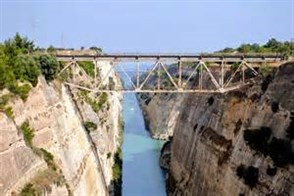A true fairy story - of Charles "Snowy" Newman MM
John Russell says, "I met Snowy at RAF Cottesmore, when I was carrying out my National Service in 1957. I think Snowy’s story is worth sharing; here’s some of it précised from an article written by Emma Southerington in 1990. As part of a school's project, Emma interviewed Snowy then aged 76; the result was published in Melton Mowbray’s local newspaper.
Snowy, also known as Chas, or sometimes Ching, was in the British Army; his first taste of conflict was in the 1930’s, pre-World War II when he was posted to Palestine, as it then was. He was part of a British force sent to quell another Jewish-Arab conflict then in progress. There he met his future wife Maria, who was a Greek National working as a nanny. After nearly three months Snowy was posted to Cairo, where he took the opportunity to marry Maria. As he didn’t have “The King’s Permission” to marry he was promptly thrown in jail, then posted to India for three months, after which he was brought back to Egypt and spent sixteen weeks on the Libyan border before being demobbed; thankfully his wife had been allowed to go to England during this period of penance, simply for falling in love.
Snowy had served his term as a regular soldier but was by default in the Reserves. So at the outbreak of WW2 he was recalled; he reported to Tidworth Camp in Wiltshire. In 1941 he was sent back to Egypt and west to the Libyan border to confront the German supported Italian invasion. However before very long he found himself on a ship bound for Greece, as part of the British force assisting Greece to defend themselves against the German advance there. Unfortunately that didn’t go well and the force he was with was compelled to retreat to Corinth, where they were to be evacuated.

To slow the German advance and aid the evacuation it was decided to hold, and then blow-up the bridge over the Corinth canal.
Snowy was one of the eighty volunteers carrying out this exercise and was promoted Sergeant just before the event.
Unbeknown to the British, they had been infiltrated by Greek fifth columnists who kidnapped Major David Harrison, one of Snowy’s officers.
Snowy donned a civilian disguise and went looking for the Major, discovering he was being held in a café and would be hanged the next evening. Snowy acquired a Tommy gun and two drums of ammunition, and in a scene that might have inspired Hollywood he stormed the café, firing at anything that moved, released the Major, stole a car and roared away.
Early the next day German paratroopers landed all along the canal; by noon Snowy was a Prisoner Of War, amongst about fifteen thousand others; the British Army had surrendered, the evacuation had failed.
Snowy and the other POWs were then marched from Corinth to Salonika (now Thessaloniki) in northern Greece, a distance of some three hundred miles. They had no rations and were forced to live off the land; two thousand men died. Snowy and fifty one other men were then loaded into a cattle truck and transported to Belgrade, Yugoslavia; fifteen of those men didn’t make it and in all, four hundred and sixty five more men died in other trucks on that three day journey.
Now in a POW camp, full of lice and with totally inadequate rations, Snowy volunteered to work in a magnetite mine, hoping to be given more food. He wasn’t and after three weeks he collapsed and was dragged back to camp. He volunteered again and was put to work breaking rocks in a granite quarry; same result.
They were on the move again, this time to Vorarlberg, in the westernmost tip of Austria. Here life was a little better; Red Cross parcels were getting through, as well as mail but by now Snowy’s wife had been told he was “missing presumed dead”, an eventual exchange of letters rectified that.
After four months Snowy joined a work party being transported elsewhere. Another three days in a cattle truck found him with eighteen others working on a farm near Gersdorf, much further east, right in the middle of Austria. This proved the old adage “never volunteer” wasn’t good advice, as this time he got lucky; the farmer was secretly pro-British. Even so, after seven more months Snowy decided to escape. He got as far as Bosnia before he walked into an ambush and was sentenced to fifty two days hard labour. He then found himself back in Vorarlberg.
The Commandant of the POW camp had lost an eye and an arm on the Russian front but was approachable; Snowy was once more volunteering for work. This time he had to march the two hundred miles back to Gersdorf. This however was a “happy” time for Snowy, as the war was in its last year and even the prisoners discovered it was now the Germans who were on the retreat.
It was time to escape once more. Unfortunately for Snowy, he didn’t know Hitler had ordered all escapees to be shot! Luckily, the soldiers who recaptured him didn’t seem to be aware of this and he was spared and sent to Salzburg. Snowy and fifteen hundred other POWs were released when Americans parachuted into that camp. He was soon repatriated to England in a Lancaster bomber and returned home to a delighted Maria.
After his second demob, ironically he found himself in charge of German POWs near Market Overton in Britain's smallest county, Rutland.

In 1946 Snowy was awarded the Military Medal for outstanding bravery, and received it personally from King George VI at a ceremony at Buckingham Palace.
He then went to Pembrokeshire and worked for David Harrison, the man whose life he had saved in Corinth. However he still had the homing instinct and after this interlude he moved back to Rutland, via Surrey, where they stayed for a short time on the way. He spent the next twenty seven years at RAF Cottesmore, near Market Overton, where Emma’s story ends and I met him; he was an MT Fitter and taught this callow youth a lot.
Snowy retired and after fifty eight years of marriage Maria passed away; I visited him a couple of times after that. Unfortunately Snowy, now over eighty was having difficulty in paying the mortgage off his ex council house. After some quite serious family difficulties in trying unsuccessfully to resolve this situation there was a fairytale ending.

Cottismore was host to two other nations at the time, with personnel drawn from the RAF, German and Italian air forces, with all three nations testing Tornado strike aircraft.
As part of this deployment a German couple came to live next door to Snowy; the German gentleman was a Colonel.
Snowy and the Colonel struck up a friendship and after a while Snowy admitted to his new neighbour that he was in financial difficulties. The next night the Colonel presented Snowy with a cheque that solved those problems.
This philanthropy knocked Snowy sideways but after some persuasion he accepted; a totally unselfish act between two former enemies was something to be celebrated.
The arrangement wasn’t all one sided, the agreement being that the Colonel would own Snowy’s house but that Snowy could live there for the rest of his life, rent free. The Colonel moved back to Germany before Snowy died but the arrangement stood; the Colonel kept the house until after Snowy had passed away."
______________________________________________
If you would like to read the full story you might like to look at my latest book - “A Country Boy at Heart"; you can do that by going to the Web site: http://www.blurb.co.uk/books/6982230-a-country-boy-at-heart, and "clicking-on" the image of the book, you’ll find it starts on page 87.
John Russell BEM, July 2016.